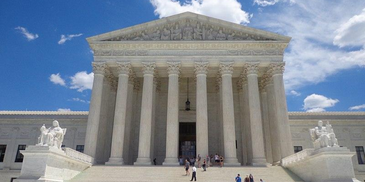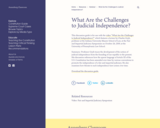
A basic introduction for visitors to the United States Supreme Court
- Subject:
- History
- Social Science
- Social Studies
- Material Type:
- Reading
- Provider:
- Supreme Court of the United States
- Date Added:
- 07/10/2024

Collection image: "The US Supreme Court up close and personal" by Yellow3467 from Wikimedia Commons, CC-BY-SA

A basic introduction for visitors to the United States Supreme Court

The Warren Court was the period from October 5, 1953, to June 23, 1969, during which Earl Warren served as chief justice of the Supreme Court of the United States. Along with the Marshall Court of Chief Justice John Marshall from 1801 to 1835, the Warren Court is remembered as one of the two most impactful periods in American constitutional law. Unlike any court before or since, the Warren Court dramatically expanded civil rights and civil liberties, as well as the powers of the judiciary and the federal government.

This discussion guide is for use with the video âWhat Are the Challenges to Judicial Independence?â which features a lecture by Charles Geyh, professor at the Indiana University Maurer School of Law, at the Fair and Impartial Judiciary Symposium on October 26, 2019, at the University of Pennsylvania Law School.

Administrative law is the area of law created by the agencies and departments of the government, which carry out the laws passed by Congress or a state legislature. Administrative law governs the decision-making and rulemaking of executive branch units of government responsible for regulating areas such as trade, labor, manufacturing, civil rights, the environment, taxation, communications, and transportation. Explore this article to learn more.

Civil law is both a legal system and a branch of law. In the United States, the term civil law refers to court cases that arise over a dispute between two non-governmental parties. Outside of the U.S., civil law is a legal system built upon Corpus Juris Civilis, the Justinian Code which originated in Rome in the sixth century. Most Western European states have a civil law system. In the U.S., Louisiana is the only state that follows the civil law tradition due to its French heritage.

Corporal punishment is a physical punishment which inflicts pain as justice for many different types of offenses. This punishment has been historically used in schools, the home, and the judicial system. While this is a general type of punishment, it is often most associated with children, and the U.N. Committee on the Rights of the Child defined it as “any punishment in which physical force is used and intended to cause some degree of pain or discomfort.”

The legal term double jeopardy refers to the constitutional protection against being made to stand trial or face punishment more than once for the same criminal offense. The double jeopardy clause is present in the Fifth Amendment to the U. S. Constitution, which provides that “No person shall ... be subject for the same offense to be twice put in jeopardy of life or limb.”

Originalism is a judicial concept asserting that all statements in the United States Constitution should be interpreted strictly according to how it would have been understood or was intended to be understood at the time it was adopted in 1787.

Prior restraint is a type of censorship in which speech or expression is reviewed and restricted before it occurs. Under prior restraint, a government or authority controls what speech or expression can be publicly released.

Qualified immunity is a judicially created legal principle that protects state and local government officials from being sued for their actions in civil court. First developed by the U.S. Supreme Court during the 1960s, the application of qualified immunity has been criticized by those who say it allows for and even encourages the use of excessive force by police.

Sedition is the act of inciting a revolt or coup d'etat against a legally established government with the intent of destroying or overthrowing it. In the United States, sedition is a serious federal felony punishable by fines and up to 20 years in prison. The following provides an overview of this particular crime against the government and how it compares to the act of treason.

An amicus brief is a legal brief filed in appeals cased to aid the court by providing extra relevant information or arguments.

Embezzlement is defined as the misappropriation of funds or property by someone who lawfully controls such funds/property, without the knowledge of the owner. It is considered a crime under the federal criminal code and state statutes, and is punishable by jail time, fines, and/or restitution.

Current PBS clips in regard to the recent SCOTUS affirmative action decision.

Robert S. Mueller III is an American attorney, former criminal prosecutor, and former director of the FBI. He spent decades investigating terrorism and white-collar crimes before being tapped by Republican President George W. Bush to head the Federal Bureau of Investigation. He is currently the Special Counsel for the United States Department of Justice, appointed by Deputy Attorney General Rod Rosenstein to investigate Russian interference in the 2016 election.